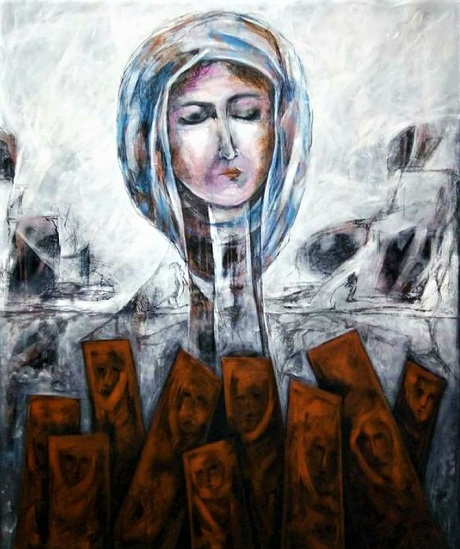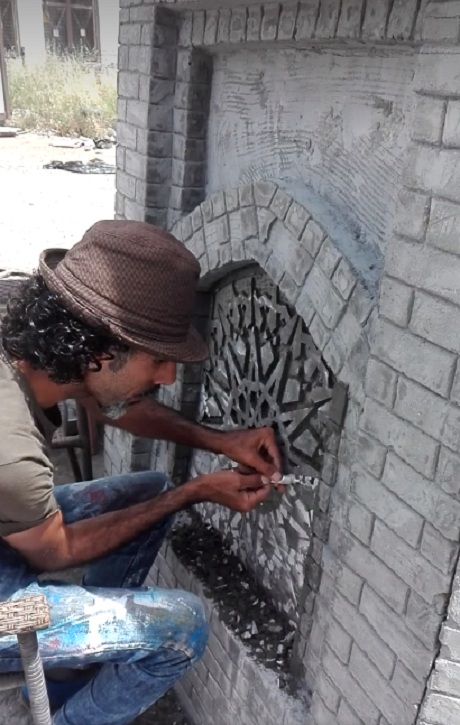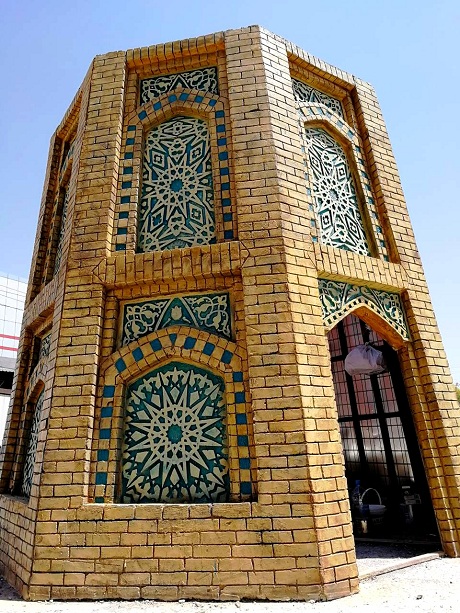"I've always been interested in history and arts, especially designing," Khalil told Rudaw English. "I want people to appreciate the value of history so that they understand the stories behind my work."
From Raqqa to Afrin in Syria and most recently the Kurdistan Region of Iraq, he is also finding a way to use his talents to restore hope in communities that have suffered for years, specifically since the beginning of the Syrian civil war in 2011 combined with the rise of ISIS across Iraq and Syria in 2014.
Khalil, born in the northeastern Syrian region of Hasaka, organized an "Art Against War" Symposium in Raqqa following the liberation of the city from ISIS on October 20.

Ferhad Khalil painting a portrait at the 'Art Against War' Symposium in Raqqa, Syria. December 2017. Photo: F.K.
Once home to some 220,000 people, Raqqa now lies largely in ruins after months of an aggressive military campaign to oust ISIS from its self-declared capital.
An estimated 1,800 civilians were killed during the battle for Raqqa, according to Airwars and the conflict monitor Syrian Observatory for Human Rights estimates that over 80 percent of the city has been damaged or destroyed.
"The point was to gather artists in a place that Daesh once controlled and sold women to show the terrorists that this place still has hope," he said, using the Arabic acronym for ISIS.
The project, which took place December 24-27, brought together 11 artists and musicians to the center of Raqqa, surrounded by demolished buildings, to let the people who were starting to return home know that they had support in rebuilding their city again and encourage people that their lives would improve.

Residents of Raqqa, Syria gather to see paintings and listen to musicians at the 'Art Against War' Symposium in December 2017. Photo: F.K.
"We wanted them to know they had support, and we wanted to show them colors with our paintings instead of blood," he said, adding that during the four-day project, a total of 18 different pieces of art were created on canvas.
"We also wanted to show the world that Raqqa can be a more peaceful and beautiful place," Khalil added. In addition to painting artwork on canvas, the group of artists and volunteers planted flowers and trees for the community amidst the rubble.
Khalil, age 47, who fled Syria to the Kurdistan Region in 2012 shortly after the war began, found himself with another group of humanitarians traveling to Afrin earlier this year when Turkey began carrying out military strikes on the formerly Kurdish-controlled city.
Turkey launched its Operation Olive Branch against Kurdish forces in Afrin on January 20 and claimed victory two months later. Large numbers of civilians fled the military offensive.

A painting by Ferhad Khalil to honor the victims of Afrin. Photo: F.K.
"I had a project in mind to create a large painting in Afrin's city center which would have been 25 meters long and 2 meters high," Khalil explained. "But we were not able to complete it due to the bombing from Turkey."
"Afrin was a really nice place before Turkey destroyed it," he added. "They were bombing indiscriminately without consideration of the people or importance of the region."
Since Khalil was unable to return to Afrin due to Turkish occupation, he created a painting to honor those who were affected by the conflict. The painting, four meters wide and two meters high, now hangs in the Intellectual Union of Rojava building in northern Syria.
Additionally, Khalil wanted to honor the victims and survivors of the Yezidi genocide which took place in Iraq on August 3, 2014 on Sinjar Mountain. He has created several paintings which portray the pain and suffering the Yezidi people are still feeling today, four years after their livelihoods were stripped away.

Khalil: "The widow's loss - I sought to paint the depths of sorrow experienced by many Yezidi women. It is etched upon her face...the faces upon the grave stones are etched in her memory. Perhaps they are her husband, her uncle, brother, nephew, or sister. The Shingal/Sinjar Mountains are embodied with stones which bear a silent testimony to the multitudes of men lost in August 2014."
Khalil says he taught himself to paint at an early age in Syria and has now been painting artistically for over 30 years, although he told Rudaw he loves designing more, which he has been doing professionally for nearly 17 years.
Prior to the beginning of the war, Khalil designed residential properties in Damascus from 2003 – 2008. In 2010 he restored the inside of a mosque in his home of Hasaka, chiseling each word of Qur'an verses in Arabic by hand on the interior of the dome.
Khalil, who lives in Erbil, is now focusing on commercial artwork. He has fully designed and painted murals on the interior walls of several well-known Kurdish and Arab style restaurants.

The interior of a popular Kurdish restaurant in Erbil designed by Ferhad Khalil.
He has also been part of design projects including gardens and other venues across the Kurdistan Region in places such as Shaqlawa and Rawanduz.
He says his inspiration to design comes from the style, engineering, architecture and even the people who live or work at a certain place.
"Every place is unique," Khalil said. "There are many similar things between Kurdish and Syrian culture because they are both Islamic. So when I go to a place, I try to understand and study the style of the culture behind it."


The base of a minaret sculpted and painted by Ferhad Khalil to be placed inside a well-known Kurdish restaurant in Erbil as interior décor. Photo before: F.K. Photo after: author
Khalil also wanted to share a message of encouragement for aspiring artists in the region.
"For people interested in art, especially the new generation, you must be brave and do not be afraid of what is happening around you," he said.
"You may face difficulties in the society or even from your own families. But you must not be afraid of facing those difficulties. The road will be very hard, so face it bravely to achieve your dreams."



Comments
Rudaw moderates all comments submitted on our website. We welcome comments which are relevant to the article and encourage further discussion about the issues that matter to you. We also welcome constructive criticism about Rudaw.
To be approved for publication, however, your comments must meet our community guidelines.
We will not tolerate the following: profanity, threats, personal attacks, vulgarity, abuse (such as sexism, racism, homophobia or xenophobia), or commercial or personal promotion.
Comments that do not meet our guidelines will be rejected. Comments are not edited – they are either approved or rejected.
Post a comment